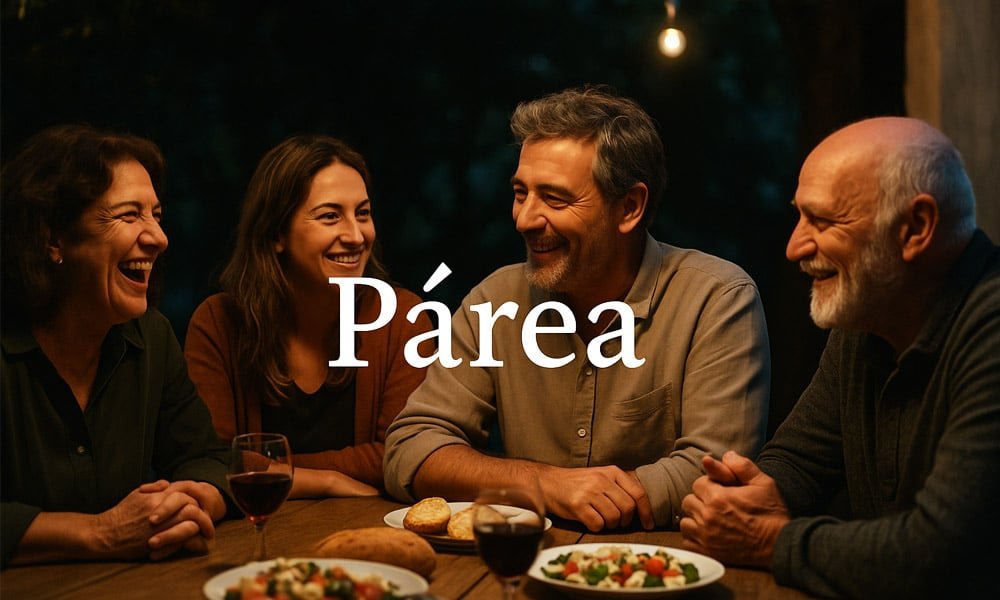In today’s noisy digital world, it’s easy to have a hundred notifications and still feel deeply alone. Yet, in Greek culture, one word quietly offers the antidote to that loneliness: párea.
Párea is not just a word—it’s a lifestyle, a feeling, and a shared experience. It describes the kind of human bond that doesn’t demand attention or validation, but offers presence and peace. Rooted in Greek tradition yet more relevant than ever in our fast-paced lives, párea is now gaining recognition beyond its homeland.
Let’s dive into how párea represents language evolving in real time—from ancient values to modern healing—and why it might be exactly what the world needs now.
Quick Bio Table Párea
| Feature | Description |
|---|---|
| Word | Párea (παρέα in Greek) |
| Literal Meaning | “A group of people beside each other” or “moving together” |
| Cultural Origin | Greece |
| Deeper Meaning | Emotional, spiritual, and authentic connection in a trusted group |
| Modern Usage | Describes meaningful social interaction, mostly in person |
| Mental Health Role | Reduces loneliness, stress, and anxiety |
| Global Spread | Found in Greek communities worldwide, especially in diaspora populations |
| Relevance Today | Increasing interest due to rising loneliness in modern societies |
More Than Friendship: The True Depth of Párea
At a glance, párea may seem to simply mean “a group of friends.” But this interpretation is far too shallow. A true párea goes beyond casual company. It is a trusted circle where emotional safety exists.
You don’t have to explain yourself in a párea. You’re not judged, corrected, or expected to perform. It’s the kind of closeness where silence is not awkward but soothing. It’s where authenticity is the only requirement.
Ancient Roots in Modern Skin
The word párea comes from the Greek root words:
-
“Para-” meaning beside
-
“-eo” meaning to go or move
Together, it translates as “moving alongside.” This linguistic history explains why párea is not passive—it’s shared progress, emotionally and socially.
In ancient Greek agoras, people gathered to share thoughts, challenge ideas, and explore philosophy—what we might now call ‘deep hangs.’ That culture of mindful connection still thrives today in the Greek way of gathering.
The Secret Ingredient: Time Without Rush
One of the essential elements of párea is unrushed time. No strict schedules, no deadlines, no phone-checking interruptions.
Modern life rarely gives people such space. But in párea, being present is the goal, not just talking or entertaining. It is a stark contrast to today’s usual meetups, where multitasking is the norm and silence feels uncomfortable.
Párea in Action: Real Scenes from Greece
Whether on a quiet balcony in Athens or under olive trees in a rural village, párea lives in daily Greek life. Plates of meze, bottles of wine, storytelling, and shared laughter aren’t rare events—they’re rituals.
Even in cities like Thessaloniki or Patras, you’ll find locals having hours-long conversations at cafes. There’s no pretense. Just real talk, emotional bonding, and openness.

The Emotional Return: What Párea Gives Back
Participating in a párea brings relief from emotional isolation. In a world full of curated images and performative interactions, párea gives people permission to just be.
It strengthens empathy, releases social pressure, and helps individuals feel visible—not for what they do, but for who they are.
Párea as Preventive Therapy
Recent studies in social psychology reveal something remarkable: connection heals. Greeks who regularly engage in párea report fewer signs of anxiety and depression. Some even experience improved memory and reduced risk of Alzheimer’s due to frequent, meaningful interaction.
In this sense, párea acts as non-clinical therapy. It’s like a warm emotional bath: no therapist required, just food, time, and truth.
Crossing Borders: Párea in the Diaspora
The Greek diaspora in cities like Toronto, Sydney, and New York has kept the spirit of párea alive. Even far from ancestral villages, families continue to pass on this tradition.
Whether at cultural festivals, Orthodox church potlucks, or local diners, párea gives immigrant communities a way to stay emotionally rooted in their identity and resist the isolation often found in foreign lands.
Párea Online: Can Screens Recreate Soul?
During the pandemic, many turned to video calls to keep párea alive. Zoom páraes emerged, with digital dinners and shared playlists. While helpful, digital párea is still a filtered version of the real thing.
Technology helps bridge the gap, but it can’t replicate the full sensory and emotional presence of in-person interaction. Still, virtual párea is better than none, especially for families living continents apart.

Párea in the Workplace: Humanizing Corporate Culture
Smart workplaces are now exploring párea-inspired changes. Some companies offer “slow rooms”—relaxation spaces for true employee connection. Others introduce monthly circle talks where teams can speak freely, share stress, or simply unwind.
This kind of culture shift turns robotic workplaces into more humane environments, leading to better morale, retention, and creativity.
Párea Across Cultures: Universally Human
While párea is Greek, similar practices exist globally:
-
“Sohbet” in Turkish and Persian Sufi circles
-
“Koinonia” in Christian fellowship
-
“Sangha” in Buddhist community living
What makes párea special is how embedded it is in everyday life—not just religious or special settings. It is ordinary intimacy, made sacred by repetition.
The Art of Building a Párea
Creating your own párea doesn’t require Greek ancestry—just intention.
Start by:
-
Inviting 2–4 people you trust
-
Sharing food (homemade or not)
-
Talking with openness, not filters
-
Scheduling regular, no-pressure time
What matters is not the menu or the location—it’s the emotional availability.
Párea and the Fight Against Loneliness
Loneliness has become a global health crisis. Párea offers an ancient cure with a modern mission: replace scrolling with sitting, comparison with conversation, and performance with presence.
For elderly populations in particular, párea can dramatically improve emotional and cognitive health—proving that this is more than a cultural habit. It’s a wellness tool.
Párea as a Social Movement
In 2025, we see párea slowly becoming a global philosophy. It’s shared in TED Talks, taught in social work, and even included in mental wellness apps. As people rethink “success,” they are realizing that emotional wealth might be more valuable than digital clout.
This growing recognition shows párea’s power as a language evolution and a lifestyle shift.
Párea and Youth: Passing the Torch
Younger generations in Greece are embracing párea again—not just out of nostalgia but from a deep need for meaning. Amid mental health challenges, Gen Z and millennials are relearning the value of presence and vulnerability.
Through community dinners, poetry nights, and no-phone hangouts, the youth are giving párea new rhythm, new slang, but the same soul.
Final Thoughts
In a hyper-connected yet emotionally starved world, párea offers a timeless alternative. It teaches us that being fully present with even a few people is more rewarding than being half-there with many.
Párea is language in action, evolving from its ancient roots to offer us a deeply human, sustainable way of living and relating. It reminds us: the most meaningful moments in life happen not when we chase attention, but when we give it freely.
So, whether you’re in a café in Athens or a kitchen in Toronto, make space for párea—and feel what it truly means to never be alone.
(FAQs)
1. What is the core meaning of párea?
Párea means a close, emotional bond among a group that provides trust, safety, and joy—beyond casual friendship.
2. Is párea unique to Greek culture?
The word is Greek, but similar concepts exist in other cultures. Párea stands out because it’s part of everyday life in Greece.
3. Can párea help with mental health?
Yes. Regular participation in a párea is linked to reduced anxiety, better memory, and increased emotional resilience.
4. Can I build a párea even if I’m not Greek?
Absolutely. Anyone can form a párea by gathering trustworthy people, sharing openly, and committing to presence.
5. Is párea still relevant in modern digital life?
Yes—perhaps more than ever. Párea offers a real-life solution to digital burnout and emotional disconnection.


